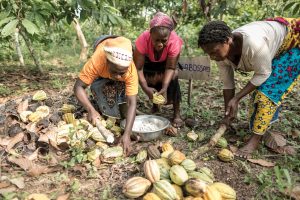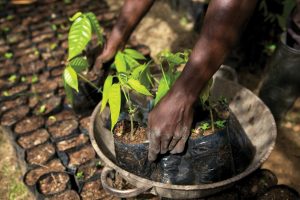Fairtrade report identifies greater combined initiatives required on key cocoa sustainability schemes

A major research project from Fairtrade has identified that the cocoa sector requires greater levels of joint working on sustainability ventures to help effectively tackle significant levels of farmer poverty that remain a crucial factor for confectionery supply chains.
According to the charitable organisation, its ‘Cocoa Sustainable Livelihoods Landscape Study’, which marks a first of its kind report published as part of the Fairtrade – Mondelēz International Cocoa Life partnership, shows how the organisations are building an understanding of the drivers of resilient livelihoods for cocoa farmers, and tackling the root causes of the challenges farmers face.
In an online press conference on the issue this morning attended by Confectionery Production, Louisa Cox, director of impact at Fairtrade, expressed her concerns that despite collective efforts from across industry, the core concern of extreme farmer poverty remains unresolved.
She said there was ‘currently a considerable overlap between livelihood initiatives’ for farming communities in Ivory Coast and Ghana, which together produce 60 percent of the world’s cocoa each year, with the report revealing findings of duplication of schemes to around 800,000 farmers.
The director noted that the income from the sector forms a vital source of income for both countries and supports approximately 2 million farmers in the region. However, the average cocoa farmer in these two countries lives on $1.50 or less each day, which falls below UN established poverty levels.
As Confectionery Production has previously reported, this has led to a drive for creating a living income for those working within the sector, supported by the introduction of a farmer premium scheme, which has been backed by key industry players in combination with Ivory Coast and Ghana governments.
Cox said: “We at Fairtrade are very proud of our partnership with Mondelez. We’ve been working together now since 2009, when Cadbury Dairy Milk was certified for the very first time.
In 2016, our partnership evolved from certification to a much broader collaboration with Cocoa Life, Mondelez’s global cocoa sustainability programme.
“Our new, overarching ambition is to bring about resilient livelihoods for cocoa farmers…and this research represents the very first step on that journey together. We wanted to understand why, despite a huge investment in time and money from the cocoa industry…the majority of cocoa farmers are still living in poverty. It was obvious to us that something isn’t working… and we wanted to know what we should be doing differently, and also understand what it would actually take to create a sector transformation?

The new report clearly shows that cocoa industry sustainability schemes set up to support cocoa farmers in West Africa must work more closely together to tackle farmer poverty. The total number of farmers reported to be targeted across all initiatives exceeds the estimated number of cocoa farmers present in the region by almost 800,000. Less than 50% of programmes combined claim to work with over 150% of farmers estimated in the country.
Given that sustainable livelihood initiatives tend to target geographic areas with the highest quantities and quality of cocoa, this figure indicates that some farmers must be benefiting from multiple initiatives due lack of coordination and duplication, whilst as many as 1.69 million could be left out, as they are not part of organised farmer co-operatives that coordinate these initiatives.
Furthermore, initiatives do not always reflect farmers’ priorities. Some assume that it is farmers alone who need to take action to improve their livelihoods, and make a limited effort to engage with or improve general market structures and processes. Recommendations on how to move beyond schemes that are focused solely on increasing productivity and incomes (currently the case for 83% of all existing initiatives) are ineffective without tackling broader market dynamics such as systemic lack of formal and longer-term contracts. Currently only 7% of all initiatives focus on these wider interconnected issues. As such, farmers must be put in the driving seat for the design of all new initiatives, to ensure a more wide-reaching approach.
The report identifies 921 sustainable livelihoods initiatives in Côte d’Ivoire and Ghana that are currently tackling the significant sustainability challenges of poverty, child labour and deforestation, which blight the cocoa industry.
These are run or funded by companies including: Cargill, Olam, Barry Callebaut, Mars, Ferrero, Hershey, Mondelēz International, certifiers Utz and Fairtrade, and multi-funded programmes such as the Cocoa & Forests Initiative which includes donors such as the UK Government’s Department for International Development, the World Bank, and retailers including Marks & Spencer and Sainsbury’s. Despite this, the report found that the industry needs to collaborate more to avoid duplications and inefficiencies, and to ensure support reaches those most in need.
To find answers to these core questions, the research sought the views of farmers themselves. Fairtrade’s mapping showed there is some alignment between the priorities of those who run the programmes and their participants, such as on increasing incomes. However, it also found that farmers’ immediate priorities are not always the same as those addressed by the sector.
For example, whilst addressing climate change and forest preservation is a popular initiative for funders, farmers who were interviewed indicated that whilst they saw the importance of this work to maintain their harvests, they place greater importance on meeting more immediate needs such as feeding their families, and in community needs such as wells, solar energy, roads, schools and health centres.

As such, the report’s key recommendations for the cocoa sector are as follows:
· Take a whole industry view to ensuring sustainable livelihoods for farmers, and address an overlap in sustainability programmes.
· Companies must mitigate farmer uncertainty through contractual security. The gains that productivity increases bring to farmer livelihoods are quickly undermined by this uncertainty about who they will sell their cocoa to.
· The sector should leave no one behind. Initiatives must tailor approaches to reach the needs of different groups of farmers and move beyond those famers ready to professionalise, to youth, sharecroppers and labourers.
Cathy Pieters, Programme Director, Cocoa Life, says: “We believe that a sustainable cocoa supply begins with empowered cocoa farmers. However, as a sector all actors need to continue to work together to make this possible. Only by holding each other accountable in addressing the report’s findings can we hope to bring about change for cocoa farmers in the years to come – and in doing so lead transformation of the cocoa sector.”
What’s next
In 2020, Fairtrade will undertake a second phase of the research that will aim to define how all the different players – from governments, traders and brands, to cocoa unions and cooperatives – might best bring their collective skills and energies to the table to deliver a future where cocoa farmers and workers thrive.
During this phase, the research team will:
1. Draw a roadmap for coordinated efforts in the sector and make partnerships more effective in achieving sustainable livelihoods for cocoa farming communities including the most marginalised.
2. Provide key recommendations to Mondelēz International’s cocoa sustainability program Cocoa Life for innovative and inclusive interventions that will address systemic constraints in their supply chain.
The research team will also make sure the proposal is in line with farming communities’ needs by including in our design methodology a farmer-centric approach.
Cox concludes: “We encourage others in the sector to implement changes based on this report’s learnings. If we all work more closely together, we can transform the cocoa sector, and create a movement for lasting change.”



